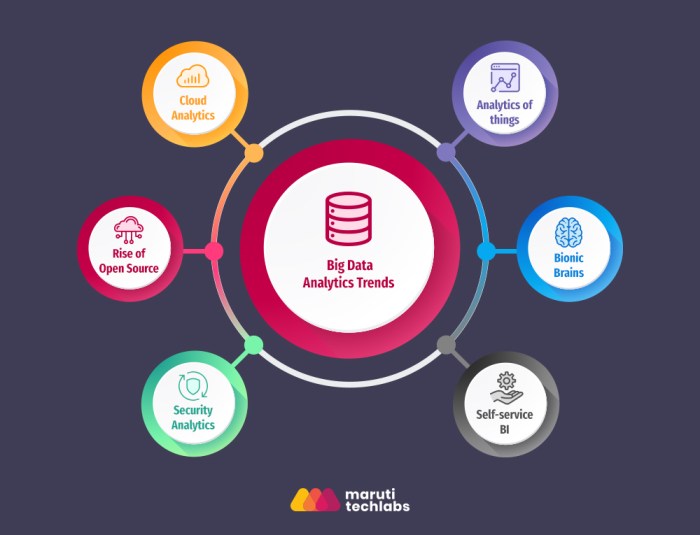Big data analytics for small business has emerged as a crucial tool, empowering entrepreneurs to make informed decisions and drive growth. In today’s data-driven landscape, leveraging insights from vast amounts of information allows small businesses to uncover trends, optimize operations, and enhance customer experiences. As these companies navigate competitive markets, the ability to harness data effectively is no longer a luxury but a necessity.
From understanding customer preferences to streamlining processes, the significance of big data analytics cannot be overstated. Small businesses that adopt these practices benefit from strategic advantages that lead to better decision-making and improved performance. By integrating data analytics into their operations, they can transform their approach and achieve sustainable success.
Importance of Big Data Analytics for Small Businesses
Big data analytics has emerged as a crucial tool for small businesses looking to enhance their decision-making processes. With the ability to analyze vast amounts of data, small enterprises can gain valuable insights that were previously accessible only to larger corporations. By leveraging these insights, small businesses can operate more efficiently and effectively in a competitive marketplace.
One of the significant benefits of big data analytics is its ability to inform strategic decisions. For example, a small retail business that analyzes customer purchasing patterns can optimize inventory management, thereby reducing costs and improving customer satisfaction. Additionally, companies that utilize data insights can tailor their marketing efforts more effectively, leading to increased sales. The competitive advantage gained through effective data utilization cannot be overstated, as it allows small businesses to anticipate market trends and adapt swiftly.
Key Components of Big Data Analytics
Understanding the key components of big data analytics tools is essential for small businesses aiming to harness the power of data. These components include data collection, data storage, data processing, and data visualization. Each element plays a critical role in transforming raw data into actionable insights.
The various data sources relevant to small businesses encompass customer transactions, social media interactions, and market research data. By integrating these diverse data streams, businesses can create a holistic view of their operations and customer behavior.
To support effective data processing, small businesses require a technological infrastructure that includes cloud computing, data management software, and analytical tools. This infrastructure not only facilitates the collection and analysis of data but also ensures that businesses can scale their operations as they grow.
Implementing Big Data Analytics, Big data analytics for small business

For small businesses looking to adopt big data analytics, a step-by-step guide can streamline the process. First, it’s essential to define clear objectives for data analytics initiatives. Next, businesses should identify the specific data they need to collect and how they will gather it. Establishing a data management plan is crucial for ensuring data quality and integrity.
Best practices for data collection and management include:
- Regularly update and clean data to remove inaccuracies.
- Utilize automated data collection tools to reduce human error.
- Ensure compliance with data privacy regulations.
A list of tools and software suitable for small businesses includes:
- Google Analytics for website data analysis.
- Tableau for data visualization.
- HubSpot for customer relationship management.
Challenges Faced by Small Businesses
While the benefits of big data analytics are substantial, small businesses often encounter challenges during implementation. Common obstacles include limited budgets, lack of expertise, and resistance to change within the organization. These hurdles can hinder the effective adoption of data analytics.
Strategies to overcome data privacy and security concerns are paramount. Businesses should invest in robust security protocols and ensure that employees are trained in best practices for data protection. Additionally, addressing the skills gap within the workforce is crucial; offering training programs can help employees develop the necessary analytical skills.
Use Cases of Big Data Analytics

Small businesses across various industries can apply big data analytics to enhance operations. For instance, in the healthcare sector, data analytics can optimize patient care by analyzing treatment outcomes. In e-commerce, businesses can use data to refine customer segmentation and targeting strategies, delivering personalized marketing campaigns that resonate with specific audiences.
Predictive analytics is another valuable application, allowing businesses to forecast sales trends based on historical data. For example, a small clothing retailer may analyze past sales data to predict demand for seasonal items, enabling them to make informed inventory decisions.
Measuring Success with Big Data Analytics
To evaluate the effectiveness of data-driven strategies, small businesses must set clear Key Performance Indicators (KPIs). These KPIs can include metrics such as customer acquisition cost, return on investment (ROI), and customer lifetime value. Regularly tracking these metrics allows businesses to assess their performance post-implementation.
Methods for tracking changes in business performance include conducting surveys, analyzing sales data, and monitoring website analytics. Continuous improvement based on data insights is essential for long-term success, as it enables businesses to adapt to changing market conditions and customer preferences.
Future Trends in Big Data Analytics for Small Businesses

Emerging technologies such as artificial intelligence (AI) and machine learning (ML) are poised to impact how small businesses utilize big data analytics. These technologies can automate data processing and enhance predictive analytics capabilities.
Potential market changes, including increasing customer expectations for personalized experiences, may affect data strategies. As a result, businesses must prioritize real-time data analytics to remain competitive and responsive to customer needs.
The growing importance of real-time data analytics cannot be overlooked. Small businesses that harness real-time insights can make faster, more informed decisions, providing them with a significant edge in a rapidly evolving marketplace.
Summary: Big Data Analytics For Small Business
In conclusion, embracing big data analytics for small business is a game-changer for those looking to thrive in a competitive environment. By understanding its importance, implementing effective strategies, and addressing challenges, small businesses can unlock new opportunities and drive measurable results. As we look to the future, the role of data will only continue to grow, making it essential for entrepreneurs to stay ahead of the curve and adapt their strategies accordingly.
